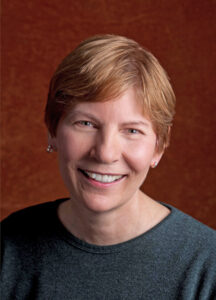I was so surprised at the start of the first session of my class on group spiritual direction when our professor handed us questions to help introduce ourselves. I jumped immediately at this one: “What’s something about you that others wouldn’t know by just looking at you?”

“I’m wearing a wig,” I said, feeling suddenly self-conscious. “I’m bald from the 14 rounds of chemo I just completed for breast cancer.” Well, that got their attention.
Later the professor asked us, “What is God’s will for you?” Not another one, I thought, although this struck me differently. I’m still recovering from seven months of cancer treatment, feeling exhausted from climbing just two flights of stairs, and wondering if I will make it through a three-and-a-half-hour class requiring full participation. “God’s will is not a punishment,” our professor noted. “God lives in you and loves you. God wouldn’t hurt you by expecting anything that isn’t already one of your deepest desires.”
That felt comforting. The notion of “deepest desire” appears in Vincent MacNamara’s book, “New Life for Old” where he defines morality as “the challenge to listen to our deepest desires, however difficult that might be, and to engage the invitation to grow in humanness” (p.10).
God’s will for me isn’t to get breast cancer and suffer the pain and sickness of surgery and chemo as some sort of test. God’s will is aligned with my will, my deepest desires, not the shallow desires of the moment, like wanting a cookie or even wishing to feel better. MacNamara says we don’t usually decide to have desires. Instead, “they come to us and take us over, in all kinds of odd ways” (p.12).
What’s he talking about? Doesn’t the Lord’s Prayer insist that we do God’s will? I’ve said “Thy will be done” thousands of times. For much of my life, I thought that meant that God was asking me to do difficult, painful things in order to earn heaven. Now I’m not so sure. I’ve only begun to understand my deepest desires. MacNamara says it would be foolish for anyone to think that this is an easy task because “there will be a long search into the caverns of our psyche if we are to know ourselves” (p.12). The discovery of my deepest desires is a lifelong journey into awareness.
Jesuit Father Anthony de Mello’s book “Awareness” enlightened me about becoming aware of God’s presence, always in everything. He says that happiness is our greatest desire, and the only way to obtain it is to remove the obstacles keeping us from experiencing it. “Under-stand the obstructions you are putting in the way of love, freedom, and happiness and they will drop. Turn on the light of awareness and the darkness will disappear. Happiness is not something you acquire; love is not something you produce; love is not something you have; love is something that has you” (p.172).
God’s will for me involves a deep dive into the farthest reaches of my soul. It’s like sinking to the bottom of the ocean floor, landing softly in the silt, and sensing the silence of the mystery of God surrounding me. I imagine a weightless body and a light emanating from within me that is God’s presence, in and around me. I am fully immersed in God. Emotions, thoughts and feelings appear and then float past.
This image appears often in my daily practice of centering prayer. My deepest, truest, most holy desires — happiness, peace, love, joy — are God-made and are God’s will. They float to the surface of my being like the bubbles of air I release with each breath. Awareness of God’s presence appears through compassion, service, prayer and love, and for that gift, I am always grateful.
(Kathy Berken has a master’s degree in theology from St. Catherine University, St. Paul, Minn. She lived and worked at The Arche, L’Arche in Clinton (1999-2009) and is author of “Walking on a Rolling Deck: Life on the Ark (stories from The Arch).”)







